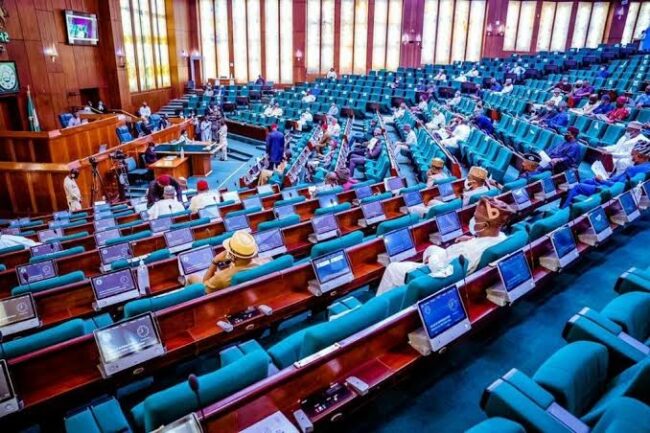The House of Representatives on Thursday tasked Federal Government on the need to ensure implementation and enforce compliance with Executive Order 003 of 2017 on the patronage of locally-produced products including textiles.
The House resolution was passed sequel to the adoption of a motion on the ‘Need to compel Uniformed Government Organisations to patronise the National Union of Textile, Garment and Tailoring Workers of Nigeria (NUTGTWN), sponsored by Hon Esosa lyawe.
In his lead debate, Iyawe observed that the textile sector represents a major hub of economic activity in most developing societics and has always been a major player in the manufacturing sector of Nigeria’s economy.
“The House also notes that the Nigerian textile industry used to be the largest employer of labour after government, with companies like Kaduna Textile Ltd. (KTL), United Nigerian Textile Plc., Supertex, Nortex Nigerian Ltd.. Aswani Textiles, Gaskiya Textiles Mill, Kano Textile Ltd.. Aba Textiles, Zamfara Textiles Ltd., Asaba Textiles Ltd., and several others that most countries in the east and west African sub-region depended on for their clothing needs.
“The House is concerned that when the Federal Government lifted the ban on textile importation in 1997, the textile sector took a massive nosedive as companies began to close down one after the other, and even after efforts by subsequent governments to mitigate the adverse effects, the industry has continued to suffer due to low patronage from Nigerians as well as inadequate support from the government through effective policies to address the situation.
“The House recalls that in 2017, via Executive Order 003, the Federal Government compelled all Ministries, Departments, and Agencies (MDAs) of government to grant preference to local manufacturers and service providers in their procurement of goods and services;
“The House is worried that the non-compliance with 2017 Executive Order 003 and the low patronage of local textiles by Nigerians in favor of cheap imported fabrics will continue to under-price the textile products made in Nigeria, cripple Nigeria’s textile industry, and consequently hamper the country’s economic growth.
“The House is cognizant that the economy of any nation grows rapidly when locally made goods are promoted through patronage, first by its people, then through export, as such patronage will stimulate the economy and provide several employment opportunities, thus the future of the Nigeria Textile Industry depends on the willpower of the government to protect it,” he noted.
Hence the House urged Federal Government to ensure implementation of and enforce compliance with Executive Order 003 of 2017 as well as embark on awareness campaigns to sensitize Nigerians on the benefits of patronizing indigenous textile manufacturers.
The lawmakers also urged Nigerian Armed Forces, Nigeria Police Force, the Federal Inland Revenue Service, the National Security and Civil Defence Corps (NSCC), the Nigeria Immigration Service, the Nigeria Customs Service, the Federal Fire Service, and other uniformed government organizations to purchase locally made fabrics.
In the same vein, the House further urged Federal Ministry of Industry, Trade, and Investment to revive the textile industry in Nigeria and provide a conducive environment that will attract both indigenous and foreign investments in the sector for sustainable economic development.
To this end , the House mandated the joint Committees on Industry and Legislative Compliance to ensure compliance.
